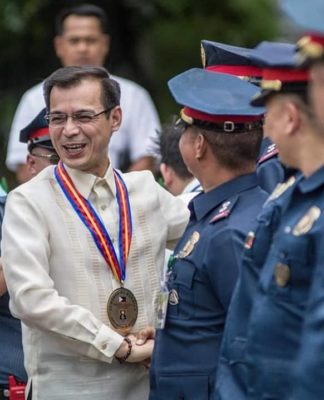THOMASIANS are still hopeful despite the “corrupt political culture” in the country, believing that electing a “business-minded college graduate” to the presidency could end the “dirty custom,” a University-wide survey has showed.
The “Political Opinions of the Youth Survey,” conducted last August 3 to 7 by the Research Cluster for Culture, Education and Social Issues, showed that Thomasian students see the upcoming elections as a “source of change.”
A “mean response” of 4.48, in a scale of 1 to 5, showed that the “country’s political culture is basically corrupt,” and this emerged as the top political concern among students.
However, respondents also believed that “young people can influence what government does,” and that “elections can bring change to society,” with averages of 4.35 and 4.22, respectively.
A total of 4,923 students from the University’s 14 colleges served as respondents. The Graduate School, the Faculties of Medicine and Surgery and Civil Law, and the Ecclesiastical Faculties did not participate.
A “ranking system,” wherein respondents were asked to rank responses to survey items using a scale of 1 to 5, was used. Based on the survery methodology, 5 meant “completely agree”/“non-negotiable,” 4 meant “somewhat agree/“good to have,” 3 meant “unnecessary”/“disagree,” 2 meant “not desirable”/“completely disagree,” and 1 stood for “no opinion.”
Respondents said it was “good to have” a college degree-holder as the next president (4.16), ruling out the presidential bid of Joseph Estrada, an Ateneo high school dropout, who was deposed in 2001 from Malacañang by the “Edsa People Power 2” uprising.
The next leader should also be business-minded (4.13) and morally upright (4.11). Students also thought being Catholic was “unnecessary” for the next chief executive, with a 3.31 average.
The survey showed that most students believe a shift to a parliamentary system of government can wait. The average was only 2.79, or almost “completely disagreeing” to any change in the system of government for now.
They said democracy still fits the Filipino culture, with elections being the best practice (4.19) and not “People Power” (3.11).
A total of 18.9 percent of the respondents said the next leaders should focus primarily on corruption. This was followed by poverty with 17.7 percent, education access and quality (14.8 percent), peace and order (11.3 percent), and inefficient government services (10.5 percent). Almost 70 percent of the respondents were not registered voters yet when the study was conducted, citing “lack of time,” but 38 percent “promised” to register this semestral break.
The researchers said voter registration might not be a priority among students at present and pointed to the “last-minute mentality” of Filipinos.
Asked to “translate their ideal qualities and opinions on political matters into leaders,” 24 percent chose Sen. Francis Escudero to become the next president. Sen. Manny Villar landed on second place with 15 percent followed by Sen. Mar Roxas with 11 percent.
Seven percent of the respondents recalled no presidential candidate, while Sen. Benigno “Noynoy” Aquino III landed on the 11th place with 1.5 percent.
The survey was conducted a month before Roxas withdrew from the race to give way to Aquino’s candidacy, which rode on the public outpouring of grief following the death of his mother, former president Corazon Aquino due to cancer last August 1.
Twenty-three percent of the respondents answered “I don’t know” when asked for their vice presidential bet. Escudero and Sen. Loren Legarda placed second and third for the position with 17 percent and 14 percent, respectively.
Alvin Ang, cluster director, said the survey did not provide a list of potential candidates to the students.
This was the reason why personalities such as Batangas Gov. Vilma Santos and Sen. Miriam Defensor-Santiago, who have not declared intentions to run for the highest post, made it to the list of “presidentiables” in the survey, with 0.1 percent and 0.8 percent, respectively.
President Gloria Macapagal-Arroyo even made it to the list, landing on the 14th place with 0.8 percent.
The survey was conducted to “gauge the political awareness and participation of the Thomasian youth.” It had a margin of error of plus or minus 1.5 percent.
Ang said the cluster plans to conduct another survey in November to address recent political developments, including Roxas’ dropping from the presidential race to make way for Aquino.
Survey team members were Artlets Dean Armando de Jesus, professors Jaime Jimenez, Claudette Agnes, Robert Montaña, Noel Asiones, and Crescencio Doma, Jr. Darenn G. Rodriguez
















